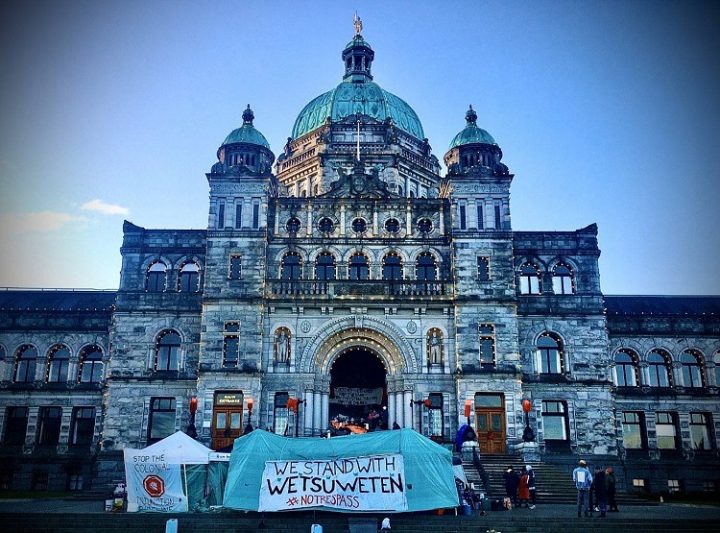Near many cities in Canada First Nation people have been active setting up blockages on rail lines to show solidarity with the Wetsuwet’en First Nation. They are saying they will not be leaving the rail lines blockages until the RCMP leaves Wet’suwet’en land.
Many protests were organized in major cities in Canada. Over 100 protestors marched through downtown London Tuesday to show solidarity with the Wet’suwet’en First Nations. Protests were also organized last week in Montreal and Ottawa.
Monday in British Colombia (B.C.) throne speech* was disrupted by Wet’suwet’en supporters. The message the B.C. government was hoping to get across was overtaken by the masses of people blocking the legislature and demanding that the government withdraw the RCMP from Wet’suwet’en territory. (Ricochet)
But supporters of the Wet’suwet’en — some of whom have been camped out for nearly a week — are helping ensure the public focus stays on what’s happening in a remote part of northern B.C., where a siege on unceded Wet’suwet’en territory has entered its sixth day. (Ricochet)
The RCMP is enforcing an injunction to allow Coastal GasLink pipeline workers into the area. Wet’suwet’en hereditary chiefs, title holders to the land, have refused to consent to the pipeline. Police have spent the last week clearing Wet’suwet’en people and their supporters from four sites along the area’s main road. The throne speech made no mention of the conflict. (Ricochet)
In fact, Today, Wednesday, marks the seventh day in a row that both passenger and commercial trains across Canada have been unable to travel those routes.
Coastal GasLink, the company building the pipeline, signed agreements with 20 elected First Nations chiefs, including the five Wet’suwet’en Bands, but they did not get the consent of the hereditary chiefs. The CGL pipeline is worth $6 billion, stretching 670-kilometres across the province, just west of Dawson Creek to a facility in Kitimat. Because the Wet’suwet’en have never signed a treaty surrendering their rights or title to their territory, the hereditary chiefs say they have the rights and title to decide what happens to their land. (Global News)
Via Rail announced late Tuesday night it would be cancelling all trips along those lines until the end of Thursday.
“Bearing in mind the heavy rail congestion that has been building since last Friday east and west of the blockade near Belleville, Via Rail is working with the infrastructure owner (CN) on the specifics of the resumption of service, which is estimated to take at least 36 hours from the time the line is cleared.” (Global News)
Another blockade were also set up near New Hazelton, B.C., and halted train service between Prince Rupert and Prince George in both directions since Saturday evening, while commuter rails in Montreal are cancelled for the third day in a row.
The national rail company said the blockades in Ontario and British Columbia are “impacting all Canadians’ ability to move goods and enable trade.”
“Hundreds of trains have been cancelled since the blockades began five days ago. The impact is being felt beyond Canada’s borders and is harming the country’s reputation as a stable and viable supply chain partner,” CN Rail said. (Global News)
For several days provincial governments were asking the federal government to initiate action to resolve this dispute. But according to the Trudeau government it’s a provincial jurisdiction.
Today Canadian Prime Minister Justin Trudeau took some action and urged those blocking rail lines in protest against the construction of a natural gas pipeline to find a quick solution, as police warned they were ready to step in and end the standoff. (Reuters)
*Throne speech – parliamentary legislature give a speech outlining any government agenda which from the traditional throne speech










